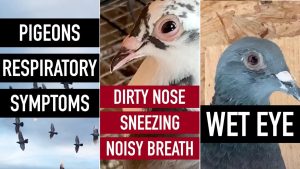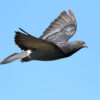
Essential Respiratory Diagnostic Tests for Racing Pigeons
Respiratory health is a cornerstone of high-performance in racing pigeons. A pigeon that breathes well flies well—and poor respiratory function can mean the difference between first place and not finishing at all. While visible symptoms like nasal discharge, wheezing, or reduced stamina are often the first clues of illness, successful fanciers know that the most effective defense is early detection through targeted diagnostic testing.
In this blog post, we’ll explore five essential respiratory tests for racing pigeons: Mycoplasma PCR, Chlamydia PCR, Trichomonas crop swab, Fungal culture, and Antibiotic sensitivity testing. Whether you’re preparing for the breeding season or gearing up for intense race training, these diagnostic tools can help you identify hidden threats and treat them before they derail your loft’s performance.
Why Respiratory Testing Matters for Pigeon Fanciers
Racing pigeons are elite athletes. Any minor infection or airway irritation can dramatically reduce oxygen exchange and muscle performance. Worse yet, many pathogens can lie dormant or present subtly, leading to chronic respiratory issues that affect entire lofts over time.
Testing offers several benefits:
- Early detection of silent infections
- Targeted treatment instead of guessing with broad-spectrum antibiotics
- Improved recovery outcomes
- Stronger breeding stock and better offspring immunity
Investing in routine diagnostics can save you from costly outbreaks and poor race results.
1. Mycoplasma PCR Test: Unmasking Chronic Respiratory Disease
Mycoplasma gallisepticum is one of the most common pathogens affecting pigeons. It often causes Chronic Respiratory Disease (CRD), especially when co-infections with E. coli or viruses are present. Symptoms include:
- Nasal discharge
- Sneezing
- Open-mouth breathing
- Poor race performance

PCR (Polymerase Chain Reaction) testing for Mycoplasma is highly sensitive and specific. Unlike cultures, which take time and may not grow, PCR detects the organism’s DNA, providing accurate and quick results.
When to use it:
- Birds showing signs of CRD
- Pre-race health screenings
- After exposure to new loft members
2. Trichomonas: Detecting Pigeon Ornithosis
Chlamydia psittaci, the cause of pigeon ornithosis, is a tricky pathogen. It affects not only the respiratory tract but also the eyes and digestive system. It’s also zoonotic, meaning it can infect humans.
Symptoms include:
- Swollen eyelids
- Watery eyes
- Reduced appetite
- Weight loss
- Respiratory strain
PCR testing for Chlamydia is the gold standard. It helps catch infections early—even when symptoms aren’t severe—allowing for timely tetracycline treatment and better flock management.
Why it matters: Chlamydia can spread rapidly within a loft and cause chronic issues. Regular PCR testing protects both birds and handlers.
3. Trichomonas Crop Swab: Early Detection of Canker
Trichomonas gallinae causes canker, a protozoal infection that can clog the throat, crop, and upper airways with yellow-white lesions. Left unchecked, it leads to breathing difficulties, feeding problems, and death.
Common symptoms:
- Difficulty swallowing
- Head shaking
- Excess saliva or drooling
- Visible throat lesions
A simple crop swab followed by microscopic examination or culture can confirm infection. Fast detection leads to immediate treatment with metronidazole or ronidazole.
Pro tip: Swab all breeding birds and race team members during pre-season health checks.
4. Fungal Culture: Guarding Against Aspergillosis
High humidity, poor ventilation, or moldy bedding can promote fungal growth, especially Aspergillus fumigatus. This fungus causes Aspergillosis, a respiratory disease that can be fatal.
Symptoms:
- Labored breathing
- Open-mouth breathing
- Voice changes
- Sudden weight loss
- Lethargy
Fungal culture from the throat, trachea, or air sacs confirms diagnosis. Birds with confirmed infections often require prolonged antifungal treatment with itraconazole.
Prevention tips:
- Keep lofts well-ventilated
- Avoid moldy grain or straw
- Use absorbent, non-organic bedding
5. Antibiotic Sensitivity Testing: Targeted Treatment That Works
Using the wrong antibiotic is not just ineffective—it can lead to drug resistance and worse outcomes. Antibiotic sensitivity testing determines exactly which antibiotics can kill the pathogens found in your pigeons.
When to request this test:
- Chronic respiratory problems that don’t respond to treatment
- After identifying pathogens via swab or culture
- When managing a large outbreak in the loft
How it works:
- Swab is taken from infected area (choana, throat, or sinus)
- Lab grows the bacteria
- Multiple antibiotics are tested for effectiveness
Benefit: You get a precise treatment plan that eliminates guesswork.
Combining Diagnostic Tests for a Full Respiratory Profile
Racing pigeons often suffer from co-infections. A bird with Mycoplasma may also have Trichomonas or a fungal component. Relying on just one test may miss the full picture.
For best results, conduct a respiratory test panel that includes:
- Mycoplasma PCR
- Chlamydia PCR
- Trichomonas crop swab
- Fungal culture
- Bacterial culture + sensitivity (if infection is found)
This complete profile allows your vet to develop a multifaceted treatment plan that addresses each pathogen and supports full respiratory recovery.
Boosting Immunity Alongside Treatment
Diagnostics and medications are vital, but don’t overlook immune support. Respiratory infections can wear birds down fast.
Support recovery with:
- Multivitamins (A, D3, E, B-complex)
- Herbal immune boosters (e.g., oregano oil, garlic extract)
- Electrolytes and energy supplements post-treatment
Clean the loft regularly, isolate sick birds, and monitor droppings and breathing even after recovery.
Final Thoughts: Testing = Health + Performance
A pigeon with clear lungs and a strong immune system is primed to win. Don’t let silent infections sabotage your race season. Schedule a full respiratory diagnostic panel before breeding or racing.
Knowing what pathogens you’re dealing with helps you:
- Treat effectively
- Prevent reinfection
- Strengthen your loft’s overall resilience
Healthy pigeons race harder, recover faster, and pass on stronger genetics.
Remember: Winning begins with breathing easy. Invest in diagnostics, and your pigeons will reward you with performance, health, and results.


